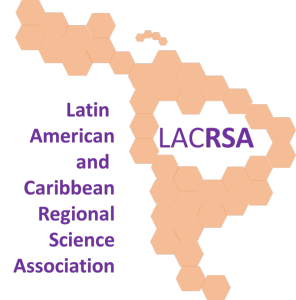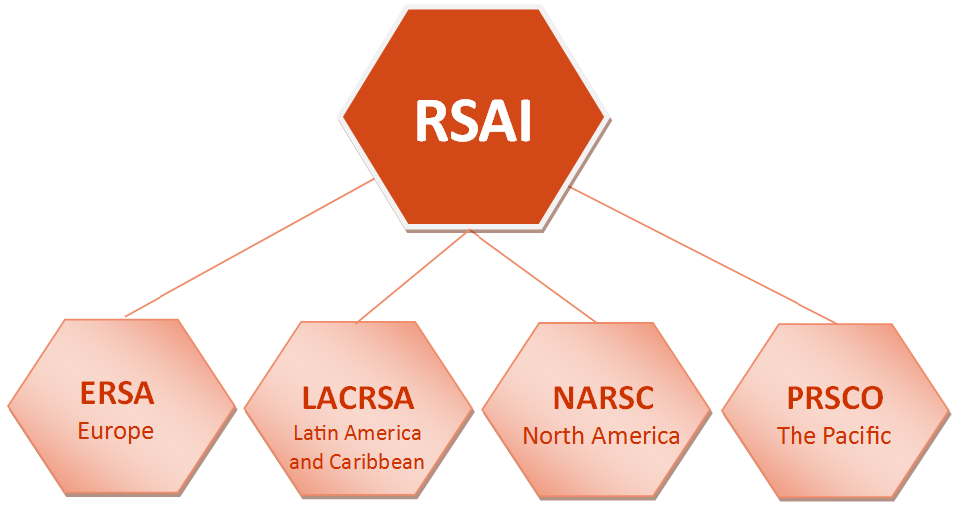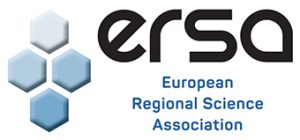The World of Regional Science Network
The Regional Science Association International (RSAI) is composed of four supraregional groupings of individual national and international sections or associations: European Regional Science Association (ERSA), North American Regional Science Council (NARSC), Pacific Regional Science Conference Organization (PRSCO), Latin American and Caribbean Regional Science Associations (LACRSA).
Regional Science Association International, RSAI
Founded in 1954, RSAI is an international community of scholars interested in the regional impacts of national or global processes of economic and social change. The work of RSAI draws on the expertise of many different disciplines, and this multi-disciplinary approach helps to facilitate new theoretical insights for tackling regional problems.
In turn, this provides an increasing opportunity for academics within the Association to engage more fully with planners and policy makers. Building on a strong foundation of quantitative methods, regional science is at the cutting edge of research into new model design for regional analysis and impact assessment. The association fosters the exchange of ideas and research within regional science through its publications and the international scientific conferences it hosts.
European Regional Science Association, ERSA
ERSA is the largest supraregional science association covered under the umbrella of the Regional Science Association International (RSAI). ERSA counts currently 20 Sections across Europe and beyond. The membership represents over 2.000 individual members. More info about our sections.
Latin American-Caribbean Regional Science Association, LACRSA
 The Latin American-Caribbean supra region of the RSAI (LACRSA) represents the affiliated and common interests of the various regional science organizations of the countries in Latin America and the Caribbean.
The Latin American-Caribbean supra region of the RSAI (LACRSA) represents the affiliated and common interests of the various regional science organizations of the countries in Latin America and the Caribbean.
LACRSA serves as the organizational body representative of the interests of its institutional and individual members with respect to the Regional Science Association International (RSAI).
LACRSA operates as an objective, scientific body without political, social, financial, or nationalistic bias. It supports its objectives by promoting acquaintance and discussion among regional scientists and with scholars in related fields, by encouraging the publication of scholarly studies, and by performing services to aid the advancement of the field of regional science.
North American Regional Science Council, NARSC
 The North American Regional Science Council (NARSC) is an international scholarly organization that focuses on regional analysis, ranging from urban and spatial economic theories to applied problems and public policies in regional development, sustainability, environmental management, transportation, land use and many other contemporary issues of our societies.
The North American Regional Science Council (NARSC) is an international scholarly organization that focuses on regional analysis, ranging from urban and spatial economic theories to applied problems and public policies in regional development, sustainability, environmental management, transportation, land use and many other contemporary issues of our societies.
They are an interdisciplinary association representing members in fields as diverse as economics, agricultural economics, public policy, urban planning, civil engineering, geography, finance, and demography. NARSC represents Regional Science in North America, and our allied regional organizations provide opportunities for local participation. These organizations represent Canada, the northeast, southern, mid-continent and western regions of the United States.
Pacific Regional Science Conference Organisation, PRSCO
 The Pacific Regional Science Conference Organisation (PRSCO) was established at the 7th Annual Meeting of the Western Regional Science Association (WRSA) in San Diego, February 1-4, 1968 at the initiative of representatives from WRSA and the Japan Section of the Regional Science Association (JSRSA).
The Pacific Regional Science Conference Organisation (PRSCO) was established at the 7th Annual Meeting of the Western Regional Science Association (WRSA) in San Diego, February 1-4, 1968 at the initiative of representatives from WRSA and the Japan Section of the Regional Science Association (JSRSA).
Their first conference of PRSCO was held at the East-West Center, University of Hawaii, August 26-29, 1969.
Subsequently, full conferences and smaller meetings have been held in Australia, Canada, Japan, Korea, Mexico, New Zealand, Singapore, Taiwan and the United States. For further details, see the Annex. A full international conference is held every second year and a smaller summer institute in alternate years.



